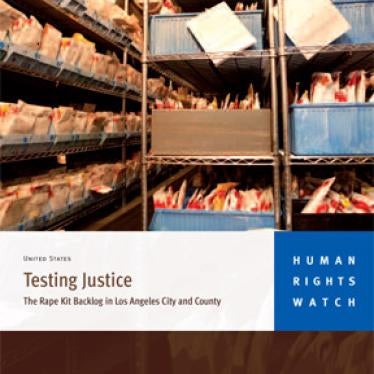Last month, the Detroit Free Press reported on Wayne County Prosecutor Kim Worthy‘s contention that as many as 10,000 untested sets of physical evidence from rapes, called rape kits, may be in Detroit police storage facilities. In response, Detroit police conceded that they don‘t normally track rape kit evidence and said they would do a count.
Rape victims expect that when they submit to the lengthy, invasive, and sometimes traumatic process of collecting DNA evidence from their bodies, the information will be used to try to find and prosecute their rapist. So the number of untested rape kits sitting in police storage may have something to do with Detroit‘s dismal law enforcement response to rape.
Detroit has one of the lowest arrest rates for rape among major cities in the United States. The FBI‘s Uniform Crime Report shows that 1,523 rapes were reported to the Detroit police from 2005 through 2007. In that same three-year period, Detroit reported only 166 arrests for rape. This means that only about 10.9% of the reported rapes resulted in an arrest.
The number of untested rape kits in police storage facilities can be a concrete indicator of how many rape victims have not received the help they are owed. Testing a rape kit can identify an assailant, confirm a suspect‘s contact with a victim, corroborate a victim‘s account of the crime, connect apparently unrelated crimes, and exonerate innocent suspects.
In 2003, when New York City began to test every booked rape kit, the arrest rate for rape skyrocketed, from 40% to 70% of reported cases. A law enforcement decision to test a rape kit is an indication of a commitment to build a strong investigation. National studies have shown that rape cases in which a rape kit was collected, tested and found to contain DNA evidence are more likely to move forward in the criminal justice system.
After the news broke about Detroit, Police Chief Warren Evans played down the importance of the untested rape kits in storage, stating that the kits are connected to cases-already processed for criminal investigations, as well as a large number of kits that never required processing because the cases were resolved without the need for DNA evidence.
Human Rights Watch initially heard the same explanation from Los Angeles Police and Sheriff‘s Department officials while researching the 12,500 untested kits in their storage facilities. After both departments audited their backlog, they discovered at least 1,500 untested rape kits from unsolved stranger rape cases. They have since made a commitment to test every rape kit in their backlog, as well as every kit booked in the future.
When we began researching the rape kit backlog in Los Angeles, we heard powerful stories from rape victims whose kits had not been tested. Without hard numbers, however, it was difficult to generate the political will to fix the problem. After an independent audit of the Los Angeles Police Department and the eventual uncovering of statistics for the whole of Los Angeles County, city and county officials promised reform. Leaders made a commitment to find the money to eliminate the backlog, and to provide the oversight required to ensure success.
Detroit needs to conduct a thorough audit to determine the extent of its rape kit backlog and the kinds of cases the untested kits represent. What the audit finds will help the police-and the community-to understand why so few rape victims in Detroit have seen justice in their cases. Then Detroit can move ahead to fix the problem.







